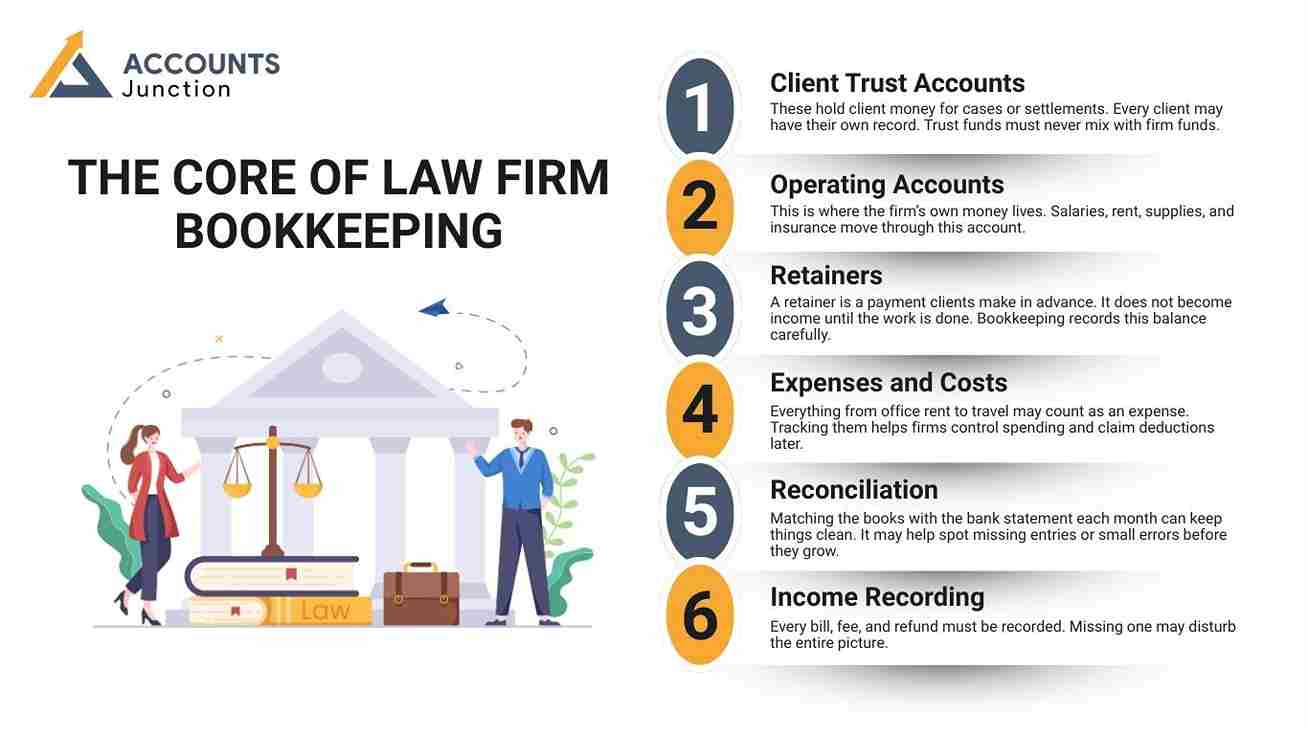
Understanding Everything About Law Firm Bookkeeping
Bookkeeping may not be the first thing lawyers think about, but it plays a big role in how a firm runs. It can help track income, manage trust accounts, and prepare reports that make decision-making easier. In short, bookkeeping keeps the business side of law in order. In this blog, we will understand what law firm bookkeeping means, why it matters, and how it can shape the way your law firm runs.
What Law Firm Bookkeeping Really Means
When one thinks of bookkeeping, rows of numbers may appear in the mind. But for a law firm, it is much more.
Law firm bookkeeping may include tracking every dollar that moves in and out of the practice. It can be client retainers, case fees, payments to vendors, or office expenses.
Each transaction may build a story of how well the firm manages its money. When done right, it may reveal the true rhythm of the business — not just the earnings, but the discipline that holds it together.
Why Bookkeeping Holds Power in a Law Firm
Many lawyers may overlook bookkeeping, yet it quietly guards the entire system. Let’s see why it stands as the base of every legal practice.
1. Builds Client Trust
- Clients pay fees with good faith. Bookkeeping ensures that each cent stays in its right place. No mix-ups. No confusion. Bookkeeping helps in creating clear records.
2. Keeps the Firm Compliant
- Rules may differ by state or bar council, but one thing remains the same — clean records protect the firm from penalties and legal risks.
3. Reveals Financial Truth
- Busy does not always mean profitable. Proper bookkeeping can show whether the firm grows or merely survives.
4. Helps in Tax Preparation
- When the year ends, a well-kept book may save hours of stress. Every expense, payment, and income sits ready for review.
5. Guides Smart Choices
- Numbers may whisper patterns that decisions often miss. A good record can tell when to expand, hire, or save.
The Core of Law Firm Bookkeeping
Certain parts form the core of how bookkeeping works in legal practices.
1. Client Trust Accounts
- These hold client money for cases or settlements. Every client may have their own record. Trust funds must never mix with firm funds.
2. Operating Accounts
- This is where the firm’s own money lives. Salaries, rent, supplies, and insurance move through this account.
3. Retainers
- A retainer is a payment clients make in advance. It does not become income until the work is done. Bookkeeping records this balance carefully.
4. Expenses and Costs
- Everything from office rent to travel may count as an expense. Tracking them helps firms control spending and claim deductions later.
5. Reconciliation
- Matching the books with the bank statement each month can keep things clean. It may help spot missing entries or small errors before they grow.
6. Income Recording
- Every bill, fee, and refund must be recorded. Missing one may disturb the entire picture.
Common Problems Law Firms May Face
Even with care, mistakes can occur within a law firm. Here are some issues that appear often.
1. Mixing Funds
- Client funds and firm’s funds in one place can cause serious trouble. It may even break trust rules.
2. Complicated Billing
- Every lawyer’s time may be billed differently. Tracking these can become messy without a clear system.
3. Delayed Entries
- Waiting too long to record transactions can lead to lost details or wrong numbers.
4. Ignored Reconciliation
- Skipping monthly checks may hide issues until they become major.
5. Weak Reporting
- Without reports, firms may not see their real position. They may guess, but not know.
Tools That Can Simplify Law Firm Bookkeeping
Technology may make bookkeeping easier and safer. A few tools stand out for legal use.
QuickBooks
- Popular for small to medium firms. It can record income, expenses, and trust accounts while linking with other software.
Xero
- Cloud-based and easy to use. It may automate much of the data entry and help with reports.
Clio Manage
- Built for law firms. It ties case management with billing and accounting features.
CosmoLex and PCLaw
- Both focus on legal needs. They may help maintain trust records, generate reports, and manage billing together.

Step-by-Step method of bookkeeping for Law Firms
Step 1: Open Separate Bank Accounts
- Keep one for client trust money and one for firm operations. It may look simple but saves countless issues later.
Step 2: Record Everything Right Away
- Do not wait till the week ends. Record every payment and receipt daily.
Step 3: Track Retainers Correctly
- Retainers must sit as liabilities till earned. Move them to income only when billed.
Step 4: Reconcile Each Month
- Compare your bank records with your books. Any mismatch may mean a hidden problem.
Step 5: Store Records Digitally
- Paper may fade or get lost. Digital storage can stay safe and easy to search.
Step 6: Review Financial Reports Regularly
- A monthly look at profit and cash flow may keep surprises away.
Step 7: Bring in a Professional Bookkeeper
- As the firm grows, a skilled bookkeeper may keep order better than a busy lawyer can.
Benefits of having a good bookkeeper for your Law Firm
- Strong client trust
- Smooth audits and fewer risks
- Easier tax seasons
- Clearer financial vision
- Early fraud detection
- More time for legal work
- Long-term stability
The Role of a Bookkeeper Inside a Law Firm
A law firm bookkeeper may not appear in court, yet their role can be just as vital. They record, verify, and manage every transaction.
They may also handle reconciliations, prepare balance reports, and track client funds. Their careful eyes may keep the firm safe from rule violations and financial chaos.
Should You Outsource Bookkeeping
Many firms now outsource this work. It can save time and reduce costs while bringing expert support.
An external bookkeeper may handle trust accounts, reconciliations, and daily entries while lawyers focus on clients.
Still, one must check privacy, accuracy, and security before trusting an outside service.
How Bookkeeping Shapes Client Relationships
When clients see clear bills and accurate balances, they feel assured. Bookkeeping does not only serve numbers; it also serves trust.
A transparent record can prevent disputes and show respect for client money. It may even make clients more likely to return.
Signs It May Be Time to Hire a Bookkeeper
- Invoices go missing
- Reports take too long to prepare
- Clients question their balances
- You feel unsure about cash flow
- Audits cause panic
If these sound familiar, a professional may bring peace to your books.
Law firm bookkeeping holds the structure that keeps everything steady in the practice. It watches, records, and tells the story of money in motion. With good bookkeeping, a law firm may work smoother, build stronger trust, and grow without fear of losing control over its numbers. At Accounts Junction, we specialize in bookkeeping for law firms. Need help with bookkeeping for your law firm? Contact us now and get our expert law firm bookkeeping services.
FAQs
1. What does law firm bookkeeping include?
- It includes recording all financial moves such as trust funds, payments, and expenses.
2. Why is bookkeeping important for law firms?
- It keeps client money safe and helps meet compliance needs.
3. What is a trust account in a law firm?
- It is a special account where client funds are kept till they are used.
4. Can lawyers manage bookkeeping on their own?
- They can, though it may take time away from their cases.
5. How often should reconciliation be done in a law firm?
- Most firms do it every month to ensure clean records.
6. What are retainers in bookkeeping terms?
- They are client payments that stay unearned till the work is done.
7. What reports should law firms check often?
- Profit and loss, cash flow, and client trust balance reports.
8. What tools can law firms use for bookkeeping?
- QuickBooks, Xero, Clio, and CosmoLex are among popular choices.
9. What mistakes do law firms often make?
- Mixing funds, skipping reconciliation, or using wrong categories.
10. When should a law firm hire a bookkeeper?
- When record keeping starts taking more time than case work.
11. Why should retainers not be income right away?
- Because the service is not yet earned when the retainer is paid.
12. What skills should a law firm bookkeeper have?
- Detail focus, trust account knowledge, and understanding of compliance.
13. Why is it risky for a law firm to mix client and business money?
- Mixing both can break compliance rules and may create confusion about who owns the money.
14. How can proper bookkeeping make tax filing easier for a law firm?
- It keeps all expenses, fees, and income documented so tax time feels smoother and faster.
15. How may a professional bookkeeper add value to a small law firm?
- A bookkeeper can manage records daily so lawyers can focus more on clients and cases.
16. How does bookkeeping protect a law firm during an audit?
- When every entry is stored and verified, audits may pass with fewer questions or stress.
17. What should a law firm track besides client payments?
- It should track office rent, payroll, court fees, and all operational expenses.
18. How may outsourcing bookkeeping help growing law firms?
- Outsourcing can save time, add expert accuracy, and lower the stress of daily entries.
